Because of the toxic compounds and heavy metals in the area, a former site for chemical plants, students from a Jiangsu school are falling ill after their school transferred to the area.
So far, almost 500 youth, enrolled at the Changzhou Foreign Language School in Jiangsu Province, have acquired serious health problems, including cancer, reported the South China Morning Post. Quoting China Central Television, the report said that tests found that the level of one carcinogen present in the area’s soil and groundwater was almost 100,000 times beyond the safety standards.
The children started to develop headaches, rashes, coughs and headaches since the end of 2015, the parents noticed. One of the three factories that operated in the place discharges sewage into a dried-up canal about 100 meters away from the school. While the rising number of sick students, including cancer diagnosis, made the parents of the affected students demand the school to move elsewhere, the school management and local education officials thumbed down the request, but they ended the autumn semester break earlier than of the usual in January.
Of the 614 students who had check-up, 493 acquired ailments such as bronchitis, lymphoma, leukemia and abnormalities in blood and thyroid. CCTV reported it on Sunday evening inthe report, titled Contaminated School, which got almost 30 million views on Sina Weibo and elicited 76,000 comments, reported Quartz.
However, instead of treating the soil further because prior treatment caused a strong stench, school authorities opted to seal the soil with a layer of clay. In mid-February, the school issued a statement, claiming the air cover and clay tested safe, which led some parents to instead move their children to other schools.
One local official even claimed the site passed an environmental impact assessment, which stated that it is safe to construct the school there, but its groundwater should not be used because of its heavy pollution.
Among the chemicals that parents found in a test they commissioned include toluene, acetone, carcinogenic benzene, manganese and fluoride in the groundwater. The environment ministry insisted that in January, 1,500 cubic meters of contaminated soil with petrochemicals have been removed.



























